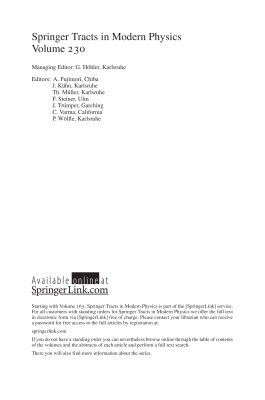Springer Science+Business Media, 2009, 185 pages
Symmetries in Atomic Nuclei aims to present an overview of recent applications of symmetry to the description of atomic nuclei. Special care is given to a pedagogical introduction of symmetry concepts using simple examples. After a historical overview of the applications of symmetry in nuclear physics, progress in the field during the last decade is reviewed. Special emphasis is put on the introduction of neutron-proton and boson-fermion degrees of freedom. Their combination leads to a supersymmetric description of pairs and quartets of nuclei. Both theoretical aspects and experimental signatures of dynamical (super)symmetries are carefully discussed. Case studies show how these symmetries are displayed by real atomic nuclei which have been studied experimentally using state-of-the art spectroscopy. This book focuses on nuclear structure physics and has been written by active investigators in the field, but its scope is wider and is intended for final-year or post-graduate students and researchers interested in understanding the power and beauty of symmetry methods in physics.
Symmetries in Atomic Nuclei aims to present an overview of recent applications of symmetry to the description of atomic nuclei. Special care is given to a pedagogical introduction of symmetry concepts using simple examples. After a historical overview of the applications of symmetry in nuclear physics, progress in the field during the last decade is reviewed. Special emphasis is put on the introduction of neutron-proton and boson-fermion degrees of freedom. Their combination leads to a supersymmetric description of pairs and quartets of nuclei. Both theoretical aspects and experimental signatures of dynamical (super)symmetries are carefully discussed. Case studies show how these symmetries are displayed by real atomic nuclei which have been studied experimentally using state-of-the art spectroscopy. This book focuses on nuclear structure physics and has been written by active investigators in the field, but its scope is wider and is intended for final-year or post-graduate students and researchers interested in understanding the power and beauty of symmetry methods in physics.

